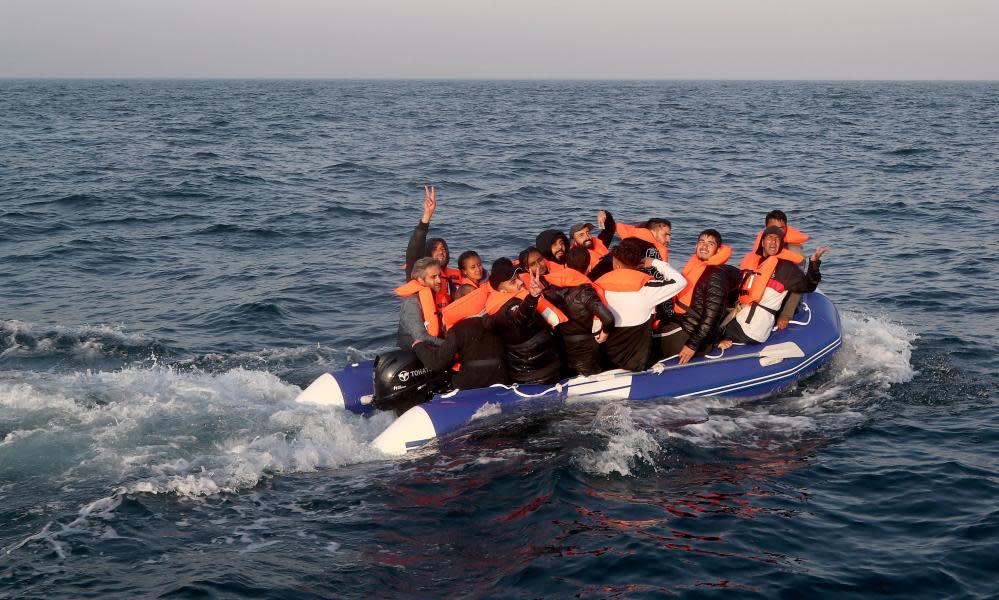EU rejects British plan for post-Brexit return of asylum seekers

EU negotiators have rejected a British request for a migration pact that would allow the government to return asylum seekers to other European countries.
When the Brexit transition period expires on 31 December, the government will lose the right to transfer refugees and migrants to the EU country in which they arrived, a cornerstone of the European asylum system known as the Dublin regulation.
The government is seeking to replicate the European system outside the bloc, although the Home Office has complained that the EU rules are “rigid, inflexible and abused by migrants and activist lawyers”.
The Guardian has learned that EU member states have ruled out a British plan to recreate the Dublin system outside the EU.
Talks on a post-Brexit deal continue this week amid rising tensions between the UK and France following the death of a Sudanese teenager while attempting to cross the Channel in an inflatable dinghy.
A British plan presented to Brussels would allow the UK to return “all third-country nationals and stateless persons” who enter its territory without the right paperwork to the EU country they had travelled through to reach British shores.
The British government would have a reciprocal obligation to take in undocumented migrants arriving in the EU via the UK, excluding airport arrivals.
At a time when southern Europe has nearly 10 times more refugees and migrants arriving by sea, the UK plan has been described in Brussels as “very unbalanced” and “not good enough”.
More than 4,100 people have crossed the Channel in small boats so far this year, compared with 39,283 who traversed the Mediterranean to Italy, Greece, Spain, Cyprus and Malta. At the height of the migration crisis in 2015, more than a million people arrived on the continent’s southern shores.
“The assessment is that this is very much picking and choosing aspects of the current EU system,” a European diplomat said. An EU official said: “The proposal, from the EU perspective, isn’t very operational and doesn’t bring a lot of added value.”
European diplomats stress that the EU’s chief negotiator, Michel Barnier, has no power to negotiate a readmission agreement on migrants with the UK. The Frenchman’s negotiating mandate, laid down by 27 governments, makes vague proposals for cooperation and “regular dialogues” on managing the thousands of people fleeing war and poverty in the Middle East and Africa.
While the UK could strike a new bilateral agreement with France, one former EU lawmaker was sceptical about mini-deals with other EU countries. “It’s a non-runner,” said Claude Moraes, a British former MEP who has co-drafted EU asylum law and chaired the parliament’s justice and home affairs committee. “They [the EU] are very sensitive to the UK cherry-picking justice and home affairs policy.”
The Labour politician accused Boris Johnson of making political statements that did not match the reality of what the government is trying to negotiate. “Politically [the prime minister] is saying we are going to have UK legislation to take back control, but privately what they are going to have to do is replicate Dublin or have some sort of agreement with the EU.”
The UK immigration minister, Chris Philp, said after talks with French officials this month that Britain and France were working “at pace” on a new plan to deter people from crossing the Channel in small boats, but he provided few details.
The French interior ministry did not respond to questions on French objectives for any bilateral plans with the UK, or EU-wide policy.
A Home Office spokesperson said: “The Dublin III regulation is inflexible, rigid and is abused by both migrants and activist lawyers to frustrate the returns of those who have no right to be here. Whilst we are bound by Dublin for the duration of the transition period, the UK will be able to negotiate its own bilateral returns arrangements from the end of this year.”
Home Office figures show the UK returns few asylum seekers to other EU countries. In 2018 it transferred 209 people under the Dublin regulation, while accepting 1,215 migrants from the rest of Europe.
While Johnson has complained about the difficulty of returning asylum seekers to the EU, European nations are unsympathetic to a country on the north-western fringes that receives relatively few asylum applications.
In 2019, Germany registered 142,450 applications for asylum, France 119,915 and Greece 74,905, according to the European Asylum Support Office. The UK recorded 44,250 asylum requests.

 Yahoo News
Yahoo News 
